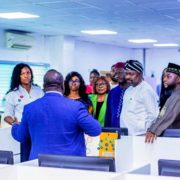Nigeria’s efforts to join the global broadband community has crystallized into a focused master-plan unfolded by the Chief Executive of the Nigerian Communications Commission, Dr. Eugene Juwah, at the Nigerian Broadband Forum which held at the Eko Hotel in Lagos, with the Secretary General of the International Telecommunications Union, Dr. Hamadoun Toure, commending government’s support for broadband connectivity.
The plan as unveiled by the Commission has, more or less, confirmed the ‘Open Access Model’ earlier indicated by the Commission as Dr. Juwah presented a clearer perspective to the plan which he said encompasses the current State Accelerated Broadband Initiative, SABI, and the Wire Nigeria Initiative, WIN, programmes of the Commission. “The Open Access Model is expected to help Nigerian’s plug into the global knowledge grid and stay competitive with other countries”, he said.
The key elements driving the objective focus on open access deployment of fibre infrastructure, according to Dr. Juwah, is to achieve high level of penetration across all geo-political zones, contribute to GDP growth and development of knowledge economy, provide commpetitive and affordable pricing, ensure intelligent incentives to support industry players while equipping Nigeria with leading infrastructure in Africa
The ultimate imperative for this objective, he said, is to realize affordable pricing, high speed connectivity, high level of coverage and targetted government support. Dr. Juwah who spoke to an international audience including Nigeria’s Communications Technology Minister, Mrs. Omobola Johnson, Representative of the ITU Secretary General, Mr. Desire Karyabwite, the Secretary of the Africa Telecommunications Union, ATU, Mr. Abdoulkarim Soumaila, and a wide range of experts and Nigerian stakeholders, said the plan is focused on accelerated broadband connectivity at affordable costumers.
The message of the ITU Sec. Gen. Dr. Toure was relayed to the forum on video, where he commended the efforts of the drivers of Nigeria’s broadband efforts and encouraged the government to support every effort directed towards broadband availability in Nigeria as this is the focus of the global ICT community.
Dr. Juwah who dissected a graphic representation of Nigeria’s model, said the essence of the presentation is to equip stakeholders and the investor community on the direction of the plan to enable their input before the implementation, having completed the preliminary studies of the Nigerian situation.
Dr. Juwah also presented a stakeholder mapping where the Commission would be responsible for provision of licenses, regulation of services, facilitation of agreements. This relationship is guided by an indsutry structure of the open access model of the type being implemented in Australia. In explaining the market service strucutre in the Nigerian model, Dr. Juwah said involves provision of non discriminatory broadband access and services to end users, and provision of e non-discriminatory equal wholesale broadband connectivity using active infrastructure, while NetCos build and operate passive infrastructure.
Dr. Juwah said the integration of the SABI and WIN in the current plan was to expand the horizon in the pursuit of the mandate of the Commission to promote the provision of modern universal efficient, reliable, affordable, and easily accessible communications services of the widest range throughout Nigeria”. The ITU Sec. Gen had through his representative at the even emphasized the need for establishment of transparent and effective regulatory framework and policy for broadband development in Nigeria.
Minister of Communications Technology, Mrs. Omobola Johnson had earlier assured of the support of the Federal government towards this initiative with a planned setting up of a Presidential Committee on Broadband deloyment while indicating that appropriate pricing and availability is critical in achieving universal access to Broadband, especially in rural areas. Global phenomenon such as the scissors effect and economic recession pose significant threat to the capacity to finance broadband infrastructure developments. Stakeholders at the event concluded among other things that:
• Broadband would facilitate the growth and availability of innovative and evolving ICT services which will increase the national GDP.
• Provision of incentives by government will stimulate investments in Broadband deployment similar to the tax exemption granted to GSM operators at the inception of GSM mobile services in Nigeria.
• Recent study shows that there is huge demand gap for broadband services in Nigeria. However, there is insufficient infrastructure to support the provision of broadband to meet the demand.
They also concluded that: strong government and political commitment towards broadband provision is required and that migration to Long Term Evolution (LTE) technology will require high level investment. It was also recommended that spectrum congestion will need to be addressed through variety of available options while 4G frequency spectrum will need to be licensed by 2015. One of the conclusions reached at the forum hosted by the NCC as part of the processes for provision of robust broadband services in Nigeria was that rapid deployment and availability of broadband will lead to the introduction of innovative services.






























